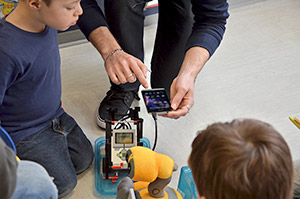TangiBot
A team of researches from the Universitat Politècnica de València has created a robot that helps develop logical thinking and social skills of children between 3 and 5 years of age
[ 10/05/2016 ]
A team of researches from the Universitat Politècnica de València has created a robot that helps develop logical thinking and social skills of children between 3 and 5 years of age.
Designed and created by the Software Engineering and Information Systems Group of the Department of Information Systems and Computing (DSIC-UPV), the main novelty of TangiBot is in its 'chassis', as it incorporates an RFID reader that allows children to interact with the robot, handling it with playthings such as EVA foam crayons, balls, plastic animal figures, etc.
These toys also incorporate RFID tags, which are all encoded enabling the robot to respond with different types of behaviour.
The goal: streamlining ICT in the context of preschool education
Javier Jaén, researcher of the Software Engineering and Information Systems Group-DSIC of the UPV, explains that the goal "was to try to figure out how to use ICT (information and communications technology) in the context of preschool education, with new ways and learning domains, how can new technologies provide support in this formative stage since, thus far, little had been researched on the early stimulation of logical thinking. That was one of our goals with the development of the robot".
To test its effectiveness, UPV researchers have conducted an experiment in different preschools in the city of Valencia –including the UPV itself– consisting of groups of children trying to move the robot from one place to another by using objects with RFID tags.
"Each of the objects", Jaén notes, "is encoded so that the robot performs different moves. Thus, children have to coordinate action sequences, both individually and with the rest of the team for the robot to reach the goal set".
The results, according to the UPV researcher, were very positive: "Children interact very easily with the robot, acquiring social skills and logical reasoning while playing".
Great potential of robotics as a teaching tool
Another of the conclusions drawn "is the innate curiosity of children for technology. Children want to understand what lies behind a game like the robot, its movement, and so on. We can talk about technology with children and educate them from an early age. And robotics, in particular, has great potential as a teaching tool for younger children", concludes Jaén.
Noticias destacadas
 Acabar con la pobreza infantil en España aumentaría el PIB un 5'7%
Acabar con la pobreza infantil en España aumentaría el PIB un 5'7%
La pobreza infantil en España, a debate en unas jornadas organizadas por la Cátedra de Infancia y Adolescencia de la UPV, en Torrevieja
 QS rankings por materias
QS rankings por materias
La UPV, reconocida como mejor universidad de España para estudiar tanto Ingeniería Agroalimentaria y Forestal como Arte y Diseño
 La 'Escuela de Diseño' cambia de nombre
La 'Escuela de Diseño' cambia de nombre
La ETSIADI (Escuela Técnica Superior de Ingeniería Aeroespacial y Diseño Industrial) sustituye la denominación de ETSID
 La UPV, en la semifinal de Solo de Ciencia
La UPV, en la semifinal de Solo de Ciencia
Entre los diez semifinalistas, se encuentran Miguel López, investigador del CVBLab-Human Tech y Carolina Ropero, doctoranda en la UPV
 Primeros pasos del museo Ciència fallera de la UPV
Primeros pasos del museo Ciència fallera de la UPV
La UPV celebra el acto de entrega de premios del I concurso "La Ciència a les Falles". Los ninots ganadores, los primeros de este nuevo museo de la universidad
 UPV-CLÍNIC
UPV-CLÍNIC
La UPV e INCLIVA firman un convenio para impulsar conjuntamente la innovación en el ámbito de la salud







